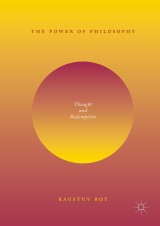Details

The Power of Philosophy
Thought and Redemption|
CHF 67.50 |
|
| Verlag: | Palgrave Macmillan |
| Format: | |
| Veröffentl.: | 12.08.2018 |
| ISBN/EAN: | 9783319969114 |
| Sprache: | englisch |
Dieses eBook enthält ein Wasserzeichen.
Beschreibungen
<p>This book explores the possibility of philosophical praxis by weaving an ontological thread through four principal thinkers: Heidegger, Schelling, Goethe, and Heraclitus. It argues that a special kind of redemptive power awaits the structural understanding of thought that is beyond semantic formations such as concepts and ideational systems. The author claims that the “power” is negative in nature, trans-personal, and derived directly from the understanding of thought as a structural pulse. The book travels backwards in time, encountering successively Heidegger’s critique of calculative thinking, Schelling’s Mind/Nature relation, Goethe’s Delicate Empiricism, and the aphoristic wisdom of Heraclitus in search of a redemptive power that lies in the self-knowledge of thought. This power is ontological and not historical or developmental; it is the same at all times and all points of history. The author refers to the praxis as “philosophical bilingualism.”</p><br></p>
<p></p><p>1. Introduction: Toward Philosophical Bilingualism.- 2. Heidegger and the Pathless Land.- 3. Schelling’s Great Leap.- 4. Goethe and Delicate Empiricism.- 5. Among the “Pre-Socratics”: Heraclitus.- 6. Philosophical Praxis.- 7. Beyond the Inner Daguerreotype.- 8. Epilogue.</p><br><p></p>
<p><b>Kaustuv Roy</b> is Professor of Philosophy and Sociology at Azim Premji University, Bangalore, India. His recent work includes <i>Limits of the Secular,</i> published by Palgrave Macmillan in 2017.</p>
<p>This book explores the possibility of philosophical praxis by weaving an ontological thread through four principal thinkers: Heidegger, Schelling, Goethe, and Heraclitus. It argues that a special kind of redemptive power awaits the structural understanding of thought that is beyond semantic formations such as concepts and ideational systems. The author claims that the “power” is negative in nature, trans-personal, and derived directly from the understanding of thought as a structural pulse. The book travels backwards in time, encountering successively Heidegger’s critique of calculative thinking, Schelling’s Mind/Nature relation, Goethe’s Delicate Empiricism, and the aphoristic wisdom of Heraclitus in search of a redemptive power that lies in the self-knowledge of thought. This power is ontological and not historical or developmental; it is the same at all times and all points of history. The author refers to the praxis as “philosophical bilingualism.”</p><br></p>
Argues that a special kind of redemptive power awaits the ontological (structural) understanding of thought Explores four principle thinkers: Heidegger, Schelling, Goethe, and Heraclitus Suggests that power is not in the “overcoming” of finite determinations but lies in grasping the material process of their formation
Diese Produkte könnten Sie auch interessieren:

Karl Schuhmann, Selected papers on phenomenology

von: Karl Schuhmann, Cees Leijenhorst, Piet Steenbakkers

CHF 177.00















